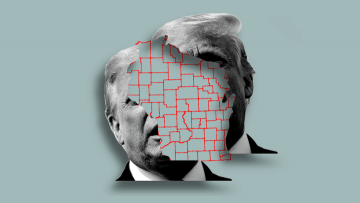David A. Graham in The Atlantic:
 No state has haunted the Democratic Party’s imagination for the past four years like Wisconsin. While it was not the only state that killed Hillary Clinton’s presidential hopes in 2016, it was the one where the knife plunged deepest. Clinton was so confident about Wisconsin that she never even campaigned there. This year, it is one of the most fiercely contested states. The Democrats planned to hold their convention in Milwaukee, before the coronavirus pandemic forced its cancellation. Donald Trump is also making a strong play for Wisconsin. Trump’s weaknesses with the electorate are familiar: Voters find him coarse, and they deplore his handling of race, the coronavirus, and protests. One recent YouGov poll found that just 42 percent of Americans approved of his performance as president, while 54 percent disapproved. But when the pollsters asked about Trump’s handling of the economy, those attitudes reversed: 48 percent approved and 44 percent disapproved, despite the havoc wreaked by the pandemic.
No state has haunted the Democratic Party’s imagination for the past four years like Wisconsin. While it was not the only state that killed Hillary Clinton’s presidential hopes in 2016, it was the one where the knife plunged deepest. Clinton was so confident about Wisconsin that she never even campaigned there. This year, it is one of the most fiercely contested states. The Democrats planned to hold their convention in Milwaukee, before the coronavirus pandemic forced its cancellation. Donald Trump is also making a strong play for Wisconsin. Trump’s weaknesses with the electorate are familiar: Voters find him coarse, and they deplore his handling of race, the coronavirus, and protests. One recent YouGov poll found that just 42 percent of Americans approved of his performance as president, while 54 percent disapproved. But when the pollsters asked about Trump’s handling of the economy, those attitudes reversed: 48 percent approved and 44 percent disapproved, despite the havoc wreaked by the pandemic.
The high marks that voters give Trump’s economic record are a key obstacle to Democratic efforts to win back Wisconsin and other upper-midwestern states. But a surprisingly effective progressive effort this spring to undermine Trump’s approval ratings on the economy provides a model for how the president’s opponents can hurt Trump where he’s strongest—and maybe even tip the election to Joe Biden.
Changing voters’ minds is famously difficult. Recent national campaigns have spent more effort on increasing turnout—getting sympathetic voters to go to the polls—than on winning over new supporters. Political scientists and pollsters have found that as the country grows more negatively polarized, fewer true swing voters are up for grabs.
But the Wisconsin effort, notable for both its approach and its scale, seems to have found some success.
More here.
